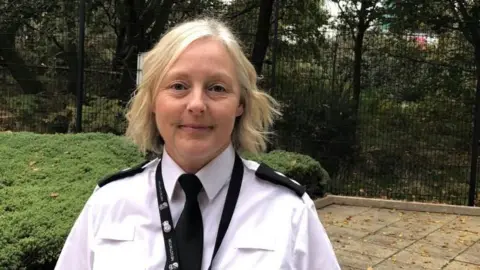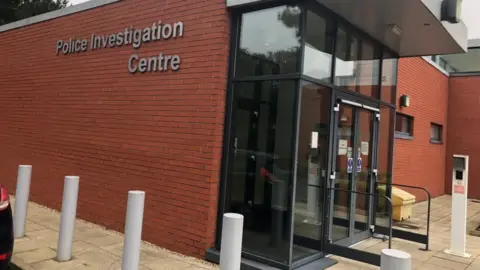Offenders will have to pay for education courses
 Vikki Irwin/BBC
Vikki Irwin/BBCOffenders will have to pay for education courses for out-of-court resolutions (OoCR) in the future.
An OoCR is a caution that can be offered to first-time offenders who commit crimes such as criminal damage, shop lifting or common assault.
Offenders do not get criminal records, but the resolutions come with an education requirement, which is currently funded by the police at a cost of £75-£110 per course.
Insp Laura Stevenson, who manages offenders for Norfolk and Suffolk police forces, said: "If we can take a more direct approach and offer an out-of-court resolution with some diversionary educational measures, it reduces reoffending and frees up the court system."
A total of about 600 OoCRs are issued across both counties each month.
 Vikki Irwin/BBC
Vikki Irwin/BBCPolice officers will deem if a crime is suitable for an OoCR (which have also been known as out-of-court disposals). Insp Stevenson's team will assess the evidence and set the conditions for the resolution, including the type of training.
The educational element of the OoCRs will be managed by a new provider called Rise Mutual from next year and offenders will have to pay for it themselves.
It will cost £75-£110 according to the type of training required. They are online and are run by facilitators to make sure offenders are taking part properly.
Insp Stevenson said: "We've got two types of courses and they're both very much in their infancy.
"When you get a caution you will have to pay to do the course.
"The money goes directly to the company that offers those courses - not into the police bank accounts."
'Better rate at reducing offending'
There is currently a backlog of about 68,000 cases in crown courts across the country and a record 17,000 suspects on remand awaiting trial.
Courts Minister Heidi Alexander said steps were being taken to reduce the backlog in Suffolk, including moving some cases to Cambridge and increasing the number of sitting days.
Insp Stevenson has been a police officer for more than 20 years and said she had been "converted" to using OoCRs to tackle "low-level" crimes.
"It is proven to have a better rate of reducing reoffending because people understand that they made a mistake and don't tend to reoffend again afterwards," she said.
An OoCR would not be offered in the case of crimes that carry custodial sentences.
Follow Suffolk news on BBC Sounds, Facebook, Instagram and X.
